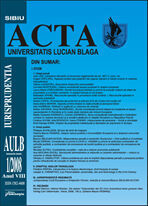Influenţa jurisprudenţei constituţionale în materializarea legislativă a principiului statului social în România
The influence of constitutional jurisprudence on legislative materialisation of the social state principle in Romania
Author(s): Nicolae ScuteaSubject(s): Law, Constitution, Jurisprudence
Published by: Universul Juridic
Keywords: social state; welfare state; constitutional court; rule of law; jurisprudence; fundamental rights.
Summary/Abstract: Although, after more than a century, the social state is in the European constitutionalism a „gained asset”, its evolution in post-revolutionary Romania has some particular features. It is a fact that for the constitutional wave, generated by the falling of communism across Eastern Europe, the principle of social state and the social rights were already indisputable and well based constitutional landmarks. Romania, as well as all other East European countries risen out of the communistic shadow, has claimed, somehow self-understood, the principle of the social state in its Constitution, together with an extended catalogue of fundamental social and economical rights. Thus, for almost two decades, the social state has marked its „under construction” status, with an obvious interest for its practical materialization. Same post-revolutionary reality indicates that the legislative affirmation of the social state principle has received a more substantial form only during the starting of negotiations for the European Union accession, whilst implementing the European acquis in the internal normative system. This historical reality merely explains why we are unable to discuss in Romania of a „classical” genesis and evolution of the social state, as occurred in Western Europe, where this social state principle has gone through relatively clearly determined stages, for over a century. This is due to the fact that the Romanian social state, similarly to other ex communistic states, was established in a state order built on the decay of the communistic state model, namely that state order which, in western European countries, has been fought against by modelling the rule of law in a social state and, then, because by historical concurrence, the Romanian social state had to „burn out” several stages, in the general effort of building up a state order comparable to that of other European countries.
Journal: Acta Universitatis Lucian Blaga. Iurisprudentia
- Issue Year: 2014
- Issue No: 02
- Page Range: 257-276
- Page Count: 20
- Language: Romanian
- Content File-PDF

